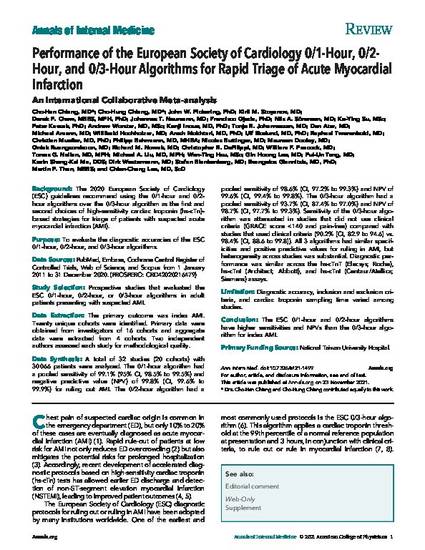
BACKGROUND: The 2020 European Society of Cardiology (ESC) guidelines recommend using the 0/1-hour and 0/2-hour algorithms over the 0/3-hour algorithm as the first and second choices of high-sensitivity cardiac troponin (hs-cTn)-based strategies for triage of patients with suspected acute myocardial infarction (AMI).
PURPOSE: To evaluate the diagnostic accuracies of the ESC 0/1-hour, 0/2-hour, and 0/3-hour algorithms.
DATA SOURCES: PubMed, Embase, Cochrane Central Register of Controlled Trials, Web of Science, and Scopus from 1 January 2011 to 31 December 2020. (PROSPERO: CRD42020216479).
STUDY SELECTION: Prospective studies that evaluated the ESC 0/1-hour, 0/2-hour, or 0/3-hour algorithms in adult patients presenting with suspected AMI.
DATA EXTRACTION: The primary outcome was index AMI. Twenty unique cohorts were identified. Primary data were obtained from investigators of 16 cohorts and aggregate data were extracted from 4 cohorts. Two independent authors assessed each study for methodological quality.
DATA SYNTHESIS: A total of 32 studies (20 cohorts) with 30 066 patients were analyzed. The 0/1-hour algorithm had a pooled sensitivity of 99.1% (95% CI, 98.5% to 99.5%) and negative predictive value (NPV) of 99.8% (CI, 99.6% to 99.9%) for ruling out AMI. The 0/2-hour algorithm had a pooled sensitivity of 98.6% (CI, 97.2% to 99.3%) and NPV of 99.6% (CI, 99.4% to 99.8%). The 0/3-hour algorithm had a pooled sensitivity of 93.7% (CI, 87.4% to 97.0%) and NPV of 98.7% (CI, 97.7% to 99.3%). Sensitivity of the 0/3-hour algorithm was attenuated in studies that did not use clinical criteria (GRACE scorepain-free) compared with studies that used clinical criteria (90.2% [CI, 82.9 to 94.6] vs. 98.4% [CI, 88.6 to 99.8]). All 3 algorithms had similar specificities and positive predictive values for ruling in AMI, but heterogeneity across studies was substantial. Diagnostic performance was similar across the hs-cTnT (Elecsys; Roche), hs-cTnI (Architect; Abbott), and hs-cTnI (Centaur/Atellica; Siemens) assays.
LIMITATION: Diagnostic accuracy, inclusion and exclusion criteria, and cardiac troponin sampling time varied among studies.
CONCLUSION: The ESC 0/1-hour and 0/2-hour algorithms have higher sensitivities and NPVs than the 0/3-hour algorithm for index AMI.
PRIMARY FUNDING SOURCE: National Taiwan University Hospital.
